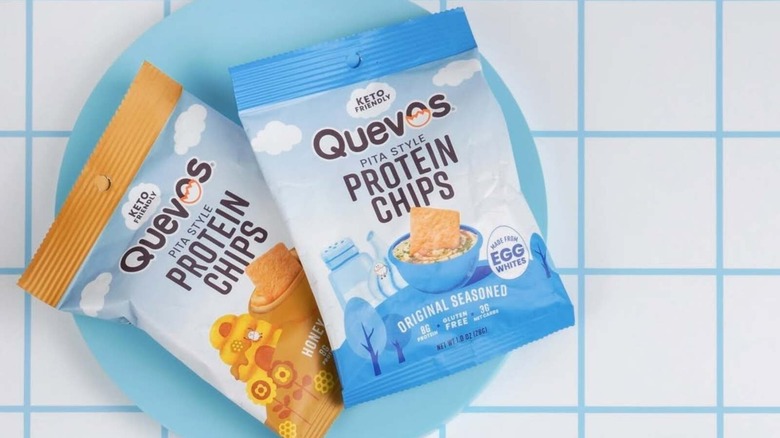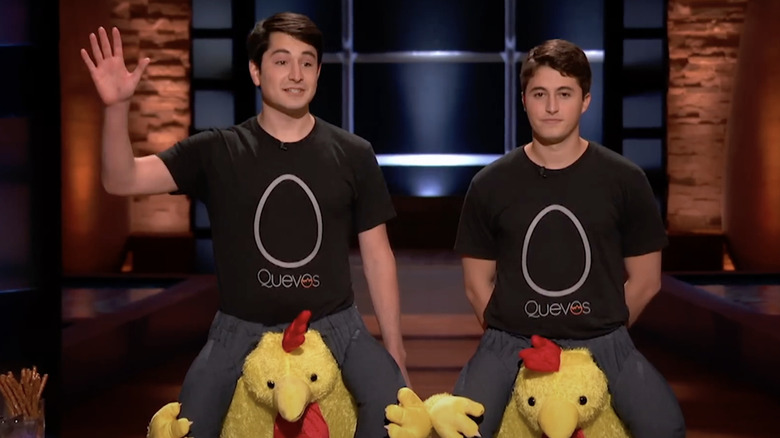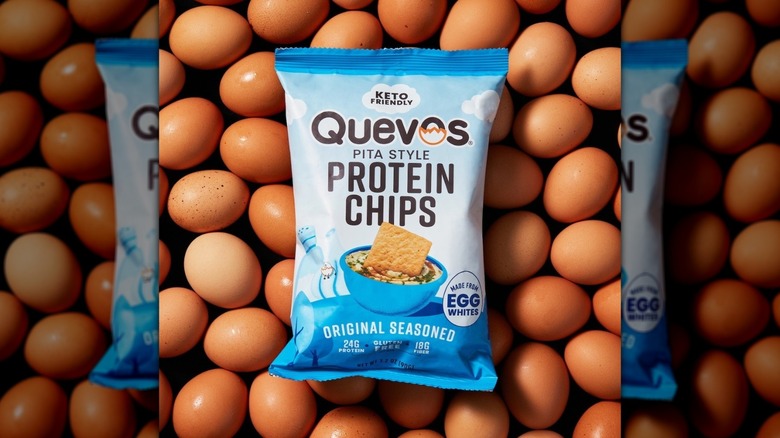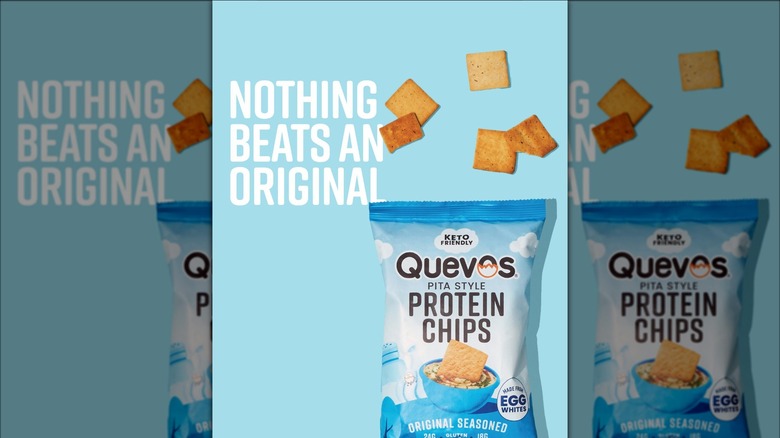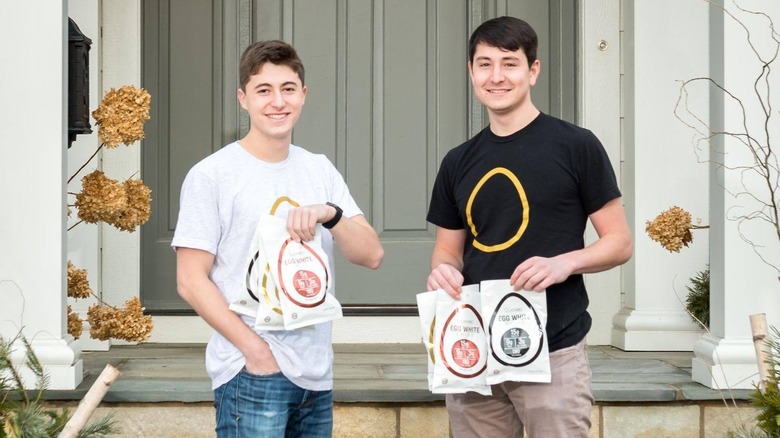Quevos: Here's What Happened After Shark Tank
Have you ever finished a snack that was promoted as a health-conscious choice, only to find it was full of all the ingredients you were trying to avoid? Zack Schreier and Nick Hamburger felt the same, so they set out to provide a snack option suitable for all kinds of diets.
Quevos are pita-style egg white chips created by the pair of best friends, who wanted to provide a snack focusing on protein and fiber. Schreier, a Type 1 diabetic, said the idea came from his personal struggle to find a healthy, but still delicious, snacking option after his diagnosis. After a successful Kickstarter that raised about $72,000, the duo founded the Quevos brand in Chicago. Schreier and Hamburger began selling in retail the year after their Kickstarter, in 2018. Though they found success in physical stores, by 2021, 80% of their sales were online.
Quevos had a decent production cost and a profitable price, but the founders' ultimate goal was to eventually sell the business. To build a brand worth purchasing by a nationwide snack provider, they needed to secure outside assistance. Toting an impressive percentage of five-star reviews, a unique product, and a drive to grow their business, the friends decided to go on "Shark Tank." But did any of the Sharks get super egg-cited for Quevos on Episode 11 of Season 12?
What happened to Quevos on Shark Tank?
Zack Schreier and Nick Hamburger trotted onto "Shark Tank" in 2021, seeking $200,000 for 5% equity. The Sharks were amused by their entrance in feathery chicken costumes, and surprised to hear that they were both only 22 years old. But any worries about their ability to run a business went out the window when Hamburger informed the Sharks that they'd raised $1.6 million in funding, including an investment from their time in the Kraft-Heinz incubation program.
Keto-friendly snacks were nothing new to the Sharks, with other products like Nui, the keto-friendly cookie brand, and Uprising, the paleo and keto bread. The panel sampled the Quevos and seemed greatly impressed at the two partners' sales and progress. However, Lori Greiner, Robert Herjavec (who was not a fan of the taste), and Mark Cuban (who cited possible marketing hiccups) ultimately passed, though all were sure to say they believed in Hamburger and Schreier's ability to succeed.
Showing a good level of business acumen, Hamburger and Schreier negotiated offers from Kevin O'Leary and Daniel Lubetzky. Though O'Leary's initial offer of $200,000 for a 10-cent royalty on each bag was first to hit the table, it wasn't structured to the pair's liking. Lubetzky encouraged the duo to increase the 5% equity, and Quevos ended up accepting his offer of $200,000 in investment and $200,000 in credit for a 10% stake in the company. Once out of the tank, Hamburger couldn't contain his enthusiasm in front of the camera, and spoke about how this was a dream scenario for a pair of business-minded, lifelong friends.
Quevos after Shark Tank
Though some businesses are unable to scale to their investor's liking, this was not the case with Quevos. Billionaire guest Shark Daniel Lubetzky went on to invest a whopping $1.35 million in the company, less than a year after Nick Hamburger and Zack Schreier's appearance on Shark Tank. However, Lubetzky insisted that the partners needed to tweak the chips themselves and rethink their packaging to reach a wider range of audiences. Hamburger and Schreier took this to heart and went to work.
After expanding production to a 32,000-square foot facility with more efficient machinery, and securing the patronage of a titan in the food industry, Quevos was ready to compete with the big dogs. The snacks' availability at different online and brick-and-mortar retailers rapidly expanded as the brand produced more inventory, which had a significant effect on profitability. A year after their appearance on Shark Tank, Hamburger and Schreier landed a spot on Forbes' 30 under 30 list for food and drink.
Having secured the niche they always sought out, the founders were in a lucrative position to execute their real goal for Quevos: selling it. Neither of them ever considered the snack brand their long-term goal, so they took it to the Sweets and Snacks expo to showcase their product. In 2023, Joe Oblas, CEO of beneFIT Brands, announced his company's acquisition of Quevos for an undisclosed amount.
Is Quevos still in business?
beneFIT brands is a nutrition-focused food company founded by Joe Oblas after he left Stryve Foods, a beef jerky brand. Oblas encountered Quevos several years prior to his acquisition of the company, and purchased it after he founded beneFIT Brands.
Though the Quevos product line was acquired by a larger company, and has not changed ownership since then, the snacks' availability seems to have tapered off. All products on Amazon, Walmart, and other major retailers are listed as out of stock as of the time of this writing. The company's last post on Instagram was on January 25, 2024, and anyone attempting to purchase from Quevos' website directly receives an "out of stock" notification or a 404 error.
Quevos chips seem to still be available at Safeway grocery stores, but its era of large-scale availability at major retailers might have come to an end, for the time being. beneFIT Brands has no official website, nor has there been any announcement regarding the status of the Quevos brand since its acquisition.
What's next for Quevos' founders?
After finding success with Quevos, Zack Schreier and Nick Hamburger started their own paths towards future goals. Appearing on podcasts and in print interviews, they both offer advice to hopeful startups and entrepreneurs about how to achieve success in business.
Hamburger refers to himself as a self-employed "Dharma Bum" on his LinkedIn page, which talks about his lifelong interest in mental health and wellbeing through meditation. He has attended and worked at several meditation centers across multiple U.S. states, to help others improve their meditation and yoga practices.
Schreier went on to found Lifestacks, a company providing a health-focused alternative to traditional coffee creamers. What makes Lifestacks unique, however, is that its staff does not see it as a coffee creamer brand. Rather, they want to provide an energy and brain health supplement with the creamer as its medium. Schreier says he is taking lessons from his time at Quevos to create a more focused company that is able to scale its most effective areas of operation, rather than the "try it all" approach he and Hamburger took with their snack brand.

